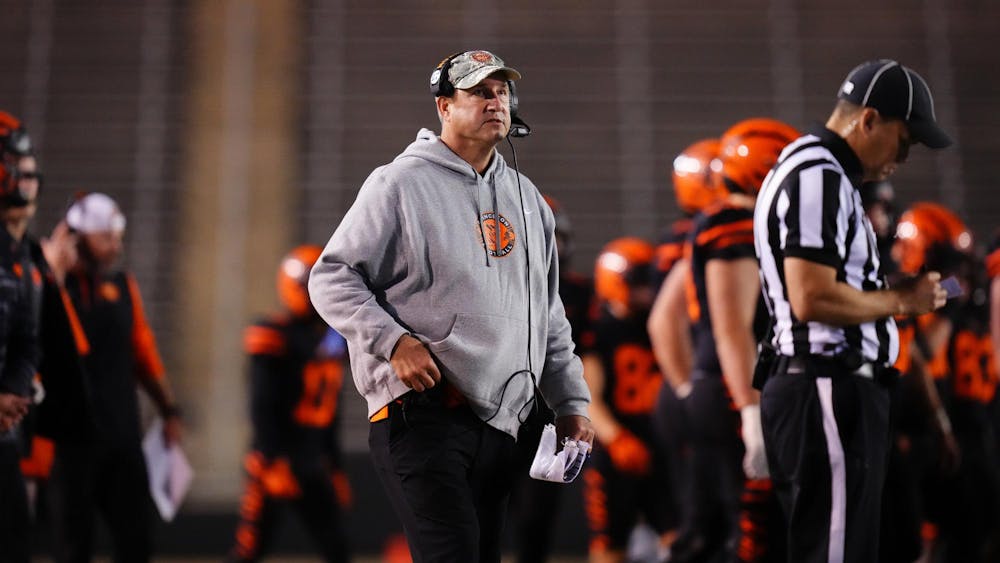As the Tigers took their final knee to see out the clock and end the season — up 20–17 against Penn — they were able to enjoy a small glimmer of delight in an otherwise dim season. Princeton football won just three games total in their worst season since 2011.
It’s hard to pinpoint exactly what went wrong for the Tigers this year, in part because it’s hard to find much that went right.
Individually, there is a lot of good to be said about many of the players — across all sides of the ball — but they never quite managed to come together as a coherent unit. Inopportune mistakes made by individual players at big moments, as well as a combination of injuries, tough competition, and a lack of adaptability doomed the Tigers’ season.
Before the season began, it was evident that big changes to the team’s lineup — including the starting quarterback, linebacker squad, and offensive coordinator — were going to impact the season’s success.
But how specifically did these issues affect the team?
On the offensive side of the ball, the team week-on-week fundamentally couldn’t prevent quarterback sacks putting them time and again in tough positions — forcing three-and-outs and losing yards. The team ranked 122nd out 123 colleges in the NCAA Football Championship Subdivision (FCS) for sacks allowed, conceding 44 sacks, 288 yards, and an average of 4.4 sacks per game.
This comes down not only to the at times poor decision-making of first-time starter junior quarterback Blaine Hipa, but also to the offensive line and offensive coordinator. The O-Line, all of them having started most (if not all) of last season, never seemed to be on the same page with Hipa, and was never able to figure out this large problem.
The Tigers also didn’t do enough to get the ball to key senior wide receivers Luke Colella and AJ Barber. The pair both got fewer yards than they did last season: Barber going from 582 to 437 yards this season and Colella going from 620 to 562 yards.
Both got slightly fewer receptions than last season too. This along with ranking last in the Ivy League for rushing — 102 yards per game — contributed to a struggling offense.
Ultimately on this side of the ball, the buck stops not only with first-year offensive coordinator Mark Rosenbaum but also with head coach Bob Surace ’90. The Tigers’ struggles on offense are a continuation from last year — where they ranked 6th for total offense — and during the off-season they haven’t seemed able to develop their playbook or fundamentally improve this aspect of the game under the new OC.
Defensively, the Tigers also had a decline from last season, going from first in the Ivy League for total defense to fourth this season. Nevertheless, time and time again the team relied on their defense for its success.
The losses of linebackers Ozzie Nicholas ’24 and Liam Johnson ’24 were always going to impact the team and this was especially evident towards the start of the season.

Injuries to key players on defense such as junior linebacker Sekou Roland, senior defensive lineman Ryan Ives, and senior linebacker Jackson Ford also had a disproportionately large effect across the season as a whole. At one point before the Dartmouth game on Nov. 8, coach Surace told The Daily Princetonian the team had more than 35 players on the injured list and thus out of the game.
Although there were times where individual errors may have resulted in questionable coverage, it’s hard to find fault with defensive coordinator Steve Verbit’s schema as he enters his 39th season of coaching at Princeton. Coach Verbit’s resumé speaks for itself and points us more towards personnel as the issue this season.
As a result of injuries, players such as first-year linebacker AJ Pigford were elevated to a far higher snap count and whilst he excelled in his role, he was moved around positionally as were many other players on defense. Linebackers became defensive ends, safeties played linebacker, and corners were moved to safeties.
On special teams, some coaching errors in games such as Dartmouth cost the team on punts or kickoffs and these only furthered the Tigers’ struggles, often in key moments.
As Surace often repeated to the ‘Prince’ throughout the season, injuries can’t be an excuse for losses. On defense, they could account for some of the failures, but a lack of adaptability offers a more broad reason for the team’s failure on both sides of the ball.
On the whole, too many key features of the team were novel and the team’s structure — practice methods, playbook, personnel — weren’t able to adapt to the challenges they faced. Injuries didn’t cause the team’s failure but merely added to the many problems they faced.
Next season, they will be hoping to build off Hipa’s year of experience at the key quarterback position, get offensive coordinator Mark Rosenbaum more comfortable in his role, and build on what may be a transitional year with many key senior players graduating this season.
Alex Beverton-Smith is an assistant Sports editor for the ‘Prince.’
Please send any corrections to corrections[at]dailyprincetonian.com.








